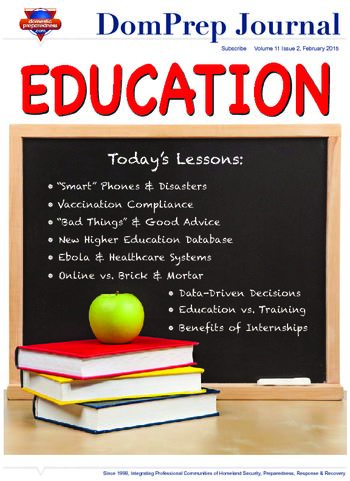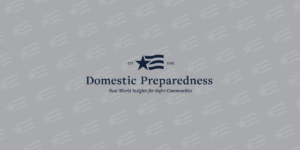

Talking to People Who Do Not Believe Bad Things Can Happen
William Kaewert
February 25, 2015
A deliberate enemy attack on U.S. infrastructure may be a credible threat but, if the warning is
provided at the wrong time, in the wrong place, or to the wrong audience, the message will have no, or
possibly even a negative, response. An effective presenter is able to tell a story, be credible, choose
wisely, get help, and ask for action.

Lessons About Measles & Vaccination Compliance
Dipti Subramanium
February 24, 2015
In December 2014, an unknown patient zero visited Disneyland in California. Whether that person knew that he or she was carrying a highly contagious infectious disease is not as important as the speed in which the disease spread and the reason behind it. There is a correlation between the resurgence of measles and vaccination practices in modern families.

Preparedness – A Balance Between Training & Education
Bruce Martin
February 18, 2015
Preparedness involves a careful balance between training and education. Successful homeland security enterprises are able to conceptualize this blend of training and education to adequately prepare their workforces and accomplish their missions. It is not enough to just know how to do something, it is equally important to know why.

Data-Driven Decisions – Lies & Statistics
Joseph Cahill
February 18, 2015
As the old saying goes, there are “lies, damned lies, and statistics.” The reality of how statistical data is gathered, compared, and used can make the decision-making process more difficult. In emergency medical services, setting the bar based on available statistics affects both lives and budgets, so decisions must be made wisely.

Internships in Emergency Management: Good for All
Wayne Bergeron
February 11, 2015
Modern emergency management agencies want more than education, more than training, and more than experience. They want it all, which makes it more difficult for an emergency management student to secure a job directly out of college. By collaborating with these agencies, universities can help their students gain the skills required for emergency management positions.

A Global Student Council & a New Higher Education Database
Matthew P. Ellis
February 11, 2015
The evolution of emergency management has necessitated an expansion of higher educational
offerings. However, in this relatively new discipline, there is no comprehensive database of the many
academic programs around the world. The International Association of Emergency Manager’s Global Student
Council seeks to fill this gap.

Ebola – Education for the American Healthcare System
Craig DeAtley
February 4, 2015
When the deadly Ebola virus travelled into the United States, many healthcare workers were not adequately prepared to manage the care, treatment, and transport of such patients. As a result, hospitals and other healthcare facilities now are scrambling to educate their personnel on this and other deadly biothreats before the next incident occurs.

How to Make a ‘Smart’ Phone ‘Undumb’ in a Disaster
Anjila Lebsock
February 4, 2015
According to a January 2014 Pew Research Center report, 58 percent of adults surveyed in the United States use smartphones. With a growing dependence on these devices, it is important to educate the public on how they can prepare for times when cellular service is not available. During a disaster, smartphones can still be “smart” with the right applications installed.

Exploring an Educational Journey
Kevin Kupietz
February 2, 2015
Emergency service fields traditionally have relied on hands-on educational strategies. However, online options are becoming more attractive because of their flexibility, availability, and cost. By matching a person’s learning style with an educational environment that is conducive to that style, professionals can continue their educational journey in new and exciting ways.

